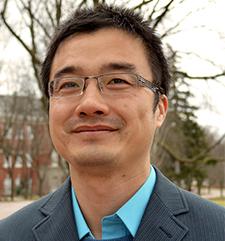PhD Candidate Raymond Ren prepares to start academic career at Shandong University

After successfully navigating the competitive academic job market earlier this year, PhD in Economics Candidate Raymond Ren is about to embark on his career as an assistant professor at Shandong University, a highly-regarded national university in China. Under the supervision of professor Alex Maynard, he has conducted research in two areas: asset pricing and financial econometrics. In this Q&A, Raymond discusses his research, experience studying at the University of Guelph and what he is most looking forward to as he takes this next step in the world of academia.
Name: Raymond Ren
Hometown: Xuchang, China
Program: PhD Economics
Why did you choose to pursue your PhD in Economics at the University of Guelph?
Economics at the University of Guelph has a well-established strength in the field of econometrics. The excellent and rigorous training and advising can prepare one very well in both academia and industry.
What does your research focus on?
My major field is asset pricing and financial econometrics. Asset pricing is the study of how various financial instruments such as stocks and bonds are priced while econometrics uses statistical and mathematical theories and methodologies to test hypotheses and forecast financial variables. These are two very interesting areas of research that are always changing, so understanding them is a valuable skill for the purposes of conducting research and also potentially impacting public policy. My thesis consists of three chapters where I apply both theoretical and empirical econometrics.
Why did you choose to focus your research in this area?
In this research area there are a lot of real-world financial and economic problems I want to explore using a more formal approach. For example, we can see a lot of coverage related to changes in asset prices in social media and I am interested in knowing why they have changed. Secondly, my training at the PhD level provides me both theoretical and empirical tools to seriously examine and answer these questions.
What are you most looking forward to about your new job opportunity?
I am looking forward to engaging in both research and teaching. I like research because you have the opportunity to investigate topics that will have some policy implication or practical impact for daily business. Also, teaching allows you to impart your knowledge to your students while learning what they need most, so that you can also update your knowledge and become a better educator.
What was it like navigating the academic job market for the first time? Any tips for future PhD Candidates?
It feels like preparing for a competitive sports game. You need to be well prepared intellectually and physically. It is intellectually challenging because you have produced excellent papers; it is physically demanding because you need to have a good healthy condition to support your research sustainably. For future PhD candidates at the University of Guelph, my suggestions are that after finishing your comprehensive examinations, try to pin down a research topic quickly, set up an implementable research agenda and engage with your supervisors efficiently.
How did your education at U of G help prepare you for this job?
It provided me with excellent training in both research and teaching. For research, both extensive and intensive training has enabled me to conduct serious economic and financial research in an independent and cooperative way. For teaching, I have accumulated many TA experiences which are very helpful for my teaching job. U of G also provides great travel support for students to give presentations and it is so helpful for students to develop communication skills at national and international conferences.
What has been the most rewarding part of the PhD in Economics program?
The most rewarding part, in addition to excellent academic training, is the interaction you have with your advisor. For example, my advisor, Professor Maynard, provided me with superb mentoring and guidance during the whole research period. The excellent advising benefits you all the time.
What advice do you have for students considering pursuing their PhD in Economics?
I would like to suggest to them to take more math courses related to economics before deciding to pursue PhD studies. Most importantly, it is very helpful to know why some quantitative methods are used in the economics and how math is used to support economic intuitions. Mastering programming skills such as Matlab or/and R are extremely helpful.